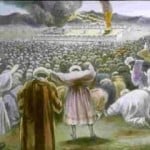Parshat Pekudei (Exodus 38:21-40:38) – The previous Torah portion of VaYakhel is usually read together with this one.What does that teach us. What is the secret of the hooks that held the Tabernacle together. How does understanding relate to mitzvoth of the Torah?
 Overview and Torah Study of Parshat Pekudei (Exodus 38:21-40:38)
Overview and Torah Study of Parshat Pekudei (Exodus 38:21-40:38)
 Moshe makes an accounting of all that was donated by the people for the making of the Mishkan as the verse says “These are the numbers of the Mishkan, the Mishkan of the Testimony, which were counted at Moses’ command”.
Moshe makes an accounting of all that was donated by the people for the making of the Mishkan as the verse says “These are the numbers of the Mishkan, the Mishkan of the Testimony, which were counted at Moses’ command”.
What can be learned from the “counting” of numbers that is different than “the gathering” in the previous portion?
Betzalel, Aholiav and their assistants make the Eight Priestly Garments — the Apron, Breastplate, Cloak, the golden crown with G-d’s name, the mitznefet or the Hat, the Tunic, the belt and linen pants. Again we are told a recurring statement. These items were made “as the Lord had commanded Moses.”Finally with Exodus 39:32. We read “All the work of the Mishkan of the Tent of Meeting was completed; the children of Israel had done [it]; according to all that the Lord had commanded Moses, so they had done.”
Why does this statement recur again and again. What is the message?
The Mishkan is completed and all its components are brought together. Then it is Moshe who erects the tabernacle as it says:
“Thus Moses did; according to all that the Lord had commanded him, so he did.Moshe anoints it and Aaron and his four sons with the Anointing Oil. Thus begins the priesthood (Exodus 40 16).
Why was Moshe then excluded from the priesthood? What eternal lesson can be gleaned from this?
The clouds of Glory return over the Mishkan after it was taken away after the sin of the golden calf. This was to signify that the Divine Presence had returned to dwell amongst the people.
Why did it come now and not after G-d pardoned the people five days earlier?
Why did it come now and not wait till after the completion of the Mishkan?
Listen to this week’s Podcast:
